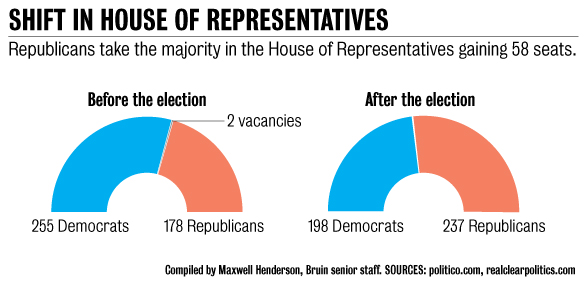Republicans took control of the House of Representatives Tuesday night, gaining 59 seats to arrive at a 234-seat majority, as of press time.
This is the largest party switch in the House since the 1948 presidential election.
When the new Congress takes over in January, Speaker of the House Nancy Pelosi (D-Calif.) will likely be replaced by current Minority Leader John Boehner (R-Ohio).
In a victory speech last night, Boehner pledged to reduce the size of the government.
“The American people have sent an unmistakable message to (the president) tonight, and that is to change course,” Boehner said to a crowd of Republicans and tea party supporters. “I’ll never let you down.”
Boehner choked back tears as he discussed his lifelong pursuit of the American dream. He described working his way up from night-shift jobs to successfully running his own small business before entering into the political arena.
As of press time, Republicans also collected six seats in the Senate, closing the party gap from 20 after the 2008 election, to five.
The Democrats’ weaker hold over the Senate may lead to some policies coming to a standstill over issues such as health care and taxation, said Phil Gussin, a professor of political science.
“The Senate is almost equally divided. (They) need 60 votes to get anything done,” Gussin said. “Everything points toward gridlock in a time when gridlock is the worst in this country.”
Political science Professor Tom Schwartz disagreed and said he believes the partisan divide between the House and the Senate will force President Barack Obama to lead in a more cooperative fashion.
“It is one thing to campaign on principle, (but leaders) have to govern with compromise,” Gussin said.
Obama may now be inclined to start making deals with Republicans, which is, according to Schwartz, an area he is not currently adept in.
Maintaining the Senate majority was not an easy task for Democrats. Majority Leader Harry Reid (D-Nev.) came close to losing his seat to tea party candidate Sharron Angle, who had held a commanding lead over Reid in the weeks leading up to the election.
Much of the shift in the House and Senate can be attributed to the emergence of the tea party, which posed a challenge both for Democrats and for the more moderate Republicans.
Two of the more prominent tea party victories were in Florida, where Marco Rubio defeated Charlie Crist (I) and Kendrick Meek (D), and in Kentucky, where Rand Paul bested Jack Conway (D).
For Schwartz though, the tea party just represents a group of Republicans who gained attention and enthused a frustrated demographic by running under a new name.
“The tea party has been able to use a new label to energize a bunch of new voters,” Schwartz said. “How long they’re going to last I don’t know.”
According to Gussin, the new Republicans in the Senate represent only a small portion of voters. Most Americans, he said, care about jobs more than conservative or liberal labels.
While reluctant to compare the tea party to the Obama administration, Gussin said the Republicans are assuming power with the same goal the president had two years ago, which was to quickly bring change to Washington on ideology rather than practicality.
“What they are going to find out is nobody changes Washington; Washington changes them,” Gussin said.
Patrick Ahrens, a fourth-year political science student and marketing director for the Bruin Democrats, said he sees the Republican takeover of the House as being a potential benefit for Democrats in 2012.
Ahrens said the Republican majority could put the House in a deadlock. This, he said, will frustrate Americans who hope to see bipartisan progress.
Gussin said Republicans would have benefitted from gaining control of the Senate as well as the House, because they would have had more power to push through their reforms. With only partial congressional control, they may instead have to justify legislative failures on Senate Democrats, he added.
With reports from Devin Kelly, Samantha Masunaga, Ryan Menezes and Allan Suwito, Bruin senior staff.
